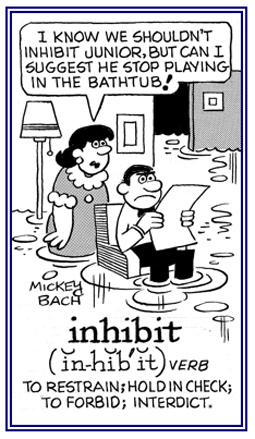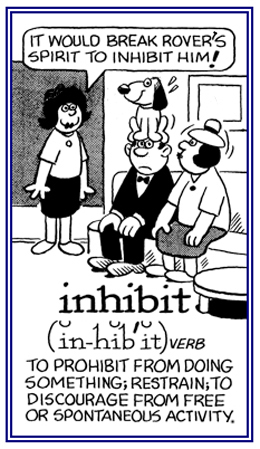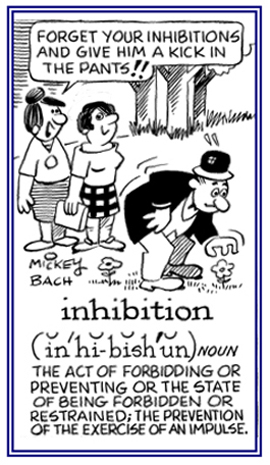habit-, hab-, -hibit; habili-, habil-
(Latin: to dwell, to live; have, hold; that which may be easily handled, is suitable, fit properly; clothing)
habitualness
habituate
A proper way or manner of behaving; a good habit: One good habitude that Jill learned while growing up was to brush her teeth in the morning and in the evening before going to bed.
Homo habilis
Literally, "skillful man"; an extinct ancestor of the modern human being (Homo sapiens) living approximately 1.5 million years ago and charactherized its ability to make and use tools.
1. A lack of capacity or means to do something: Grandmother was blind and therefore had the inability to see.
2. Absence of enough power, capacity or resources: Although Tim had been in school for many years, he still had the inability to read up to grade level.
2. Absence of enough power, capacity or resources: Although Tim had been in school for many years, he still had the inability to read up to grade level.
indebted
indebtedness
inhabit (verb), inhabits; inhabited; inhabiting
To live as a person, an animal, or a group in or occupying a place or an environment: "Certain species of birds are inhabiting North America while others kinds of birds inhabit other geographic areas."
1. The quality of being liveable: The inhabitability of the North Pole is not given for the existence of cacti.
2. The capability of being present in something: The attic at Joan's house provided the inhabitability of storing many old books and trunks full of memories of the family.
2. The capability of being present in something: The attic at Joan's house provided the inhabitability of storing many old books and trunks full of memories of the family.
inhabitable (adjective), more inhabitable, most inhabitable
Suitable to be lived in: Tom's lovely home was inhabitable, but his father's pickup truck really wasn't very inhabitable!
inhabitant
inhabitation
inhabited (adjective), more inhabited, most inhabited
Pertaining to areas where various creatures live: "The loneliest inhabited places on earth are probably the Arctic and Antarctic regions."
inhibit (verb), inhibits; inhibited; inhibiting
1. To stop or to hold back something from continuing or developing: Congress was told that their proposed changes in spending could drastically inhibit economic growth.
3. To slow down or adversely affect a bodily process or the action of an organ: Certain prescription drugs are inhibiting the spread of some infections.

© ALL rights are reserved.

© ALL rights are reserved.
Go to this Word A Day Revisited Index
When plants are placed in a dark room, their growth is inhibited.
2. To prevent a person from behaving or speaking freely: Karen was told that she should not allow fear of failure to inhibit her efforts to get a salary increase.3. To slow down or adversely affect a bodily process or the action of an organ: Certain prescription drugs are inhibiting the spread of some infections.
A drug that inhibits the growth of cancer cells is considered a very good thing.
4. In electronics, to prevent a certain signal or event from occurring: The computer engineer inhibited the operation of specific circuits.

Go to this Word A Day Revisited Index
so you can see more of Mickey Bach's cartoons.
1. A feeling of being embarrassed or a belief that prevents a person from behaving spontaneously or speaking freely: Marie is a very outgoing person and so she doesn’t have any inhibitions of talking to people she meets for the first time.
2. A mental state in which a person's activity or behavior is stifled or obstructed: Shy people are often said to suffer from inhibitions.
3. The slowing down or prevention of a chemical reaction: Certain substance inhibitions are widely used to retard various undesirable processes; for example, the corrosion of metals.
4. The suppression or blocking of a bodily process or the action of an body organ: The doctor caused the inhibition of Jim's heart beat with an electrical stimulation of the vagus nerve.
5. Etymology: from Latin inhibitus; from inhibere, "to hold in, to hold back, to restrain"; from in-, "in, on" harbere, "to have, to hold".

© ALL rights are reserved.
Go to this Word A Day Revisited Index
2. A mental state in which a person's activity or behavior is stifled or obstructed: Shy people are often said to suffer from inhibitions.
3. The slowing down or prevention of a chemical reaction: Certain substance inhibitions are widely used to retard various undesirable processes; for example, the corrosion of metals.
4. The suppression or blocking of a bodily process or the action of an body organ: The doctor caused the inhibition of Jim's heart beat with an electrical stimulation of the vagus nerve.
5. Etymology: from Latin inhibitus; from inhibere, "to hold in, to hold back, to restrain"; from in-, "in, on" harbere, "to have, to hold".



